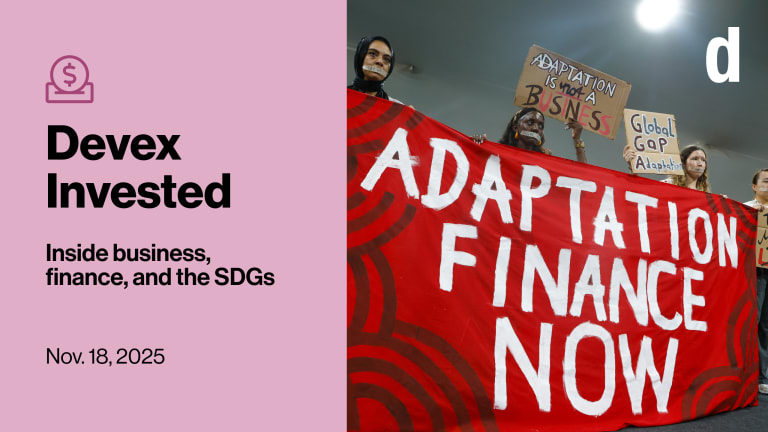
Nobel Prize winner and former World Bank chief economist Joseph Stiglitz gave a public talk earlier this month on “Tax, Justice and the Good Society,” so of course we asked him about the role of the Gates Foundation and its tax-deductible philanthropy in tackling modern ills.
“I'm all in favor of people like [Bill] Gates giving back his money," Stiglitz told the audience of around 400 people at the University of Melbourne, Australia.
But he went further:
“The fundamental question of the decisions about what kind of society we have should be collectively decided and not delegated to a foundation,” he said. “Their voice is very strong. The Gates Foundation has been very good in getting health care to developing countries and emerging markets, but there are a lot of disagreements about the best way of doing that. And should you let one person make those critical decisions?”
COVID-19 shone a spotlight on the Gates Foundation’s influence over global health, with a lengthy 2022 investigation by WELT and POLITICO pointing to the foundation’s role in resisting intellectual property waivers as a means of tackling the pandemic.
Stiglitz told the Melbourne audience of his well-known enthusiasm for a one-off monetary prize — rather than patents — as a way of rewarding innovation.
“I talked to the Gates Foundation about it, and they weren’t interested,” Stiglitz said. “Why? Well, you know, intellectual property is part of their mentality. So I thought, here’s this irony: All the money that comes from the abuse of intellectual property in technology is being transferred to an abuse of intellectual property in pharmaceuticals. But you could have gotten so much more leverage if they had created a more competitive market in pharmaceuticals.”
We asked the Gates Foundation for its reaction to Stiglitz’s comments, and they directed us to a statement on their website outlining the foundation’s view on intellectual property.
Related reading: Inside the push to make intellectual property work for African pharma
Related opinion: A global pandemic agreement must include IP flexibilities
From our archives: Could an IP waiver have averted millions of COVID-19 deaths?
The debt pause clause
As more countries face debt distress and climate change-driven disasters mount, advocates have been pushing multilateral development banks to insert clauses into their loan agreements and contracts to pause debt repayment in the case of a climate disaster.
Now there is a test case that could help show how effective the tool could be. Last week, the government of Grenada told investors in its $112 million bond that it was triggering a disaster debt clause pause. It was the first of its kind when the Caribbean nation put that clause into the bond agreement nearly a decade ago.
Let’s see how well it works and if it leads to more momentum to include similar debt relief in future lending or borrowing.
At the United Nations COP 28 climate summit last year, five MDBs committed to putting such clauses into their agreements. The World Bank said it would broaden the scope of the clauses to apply to more countries, include a pause on interest payments, and allow for related fees to be covered by concessional funds. The Inter-American Development Bank, the African Development Bank, the European Bank for Reconstruction and Development, and the European Investment Bank also said they would expand or begin using debt pause clauses.
Related opinion: Debt is crippling Africa’s just net-zero transition potential
ICYMI: Small island states seek world’s ‘full support’ for resilience strategy
Big spenders
€14.9 billion
—That’s how much EBRD had in its pipeline across 300 projects in 2023, a new high mark. Our colleague Alecsondra Kieren Si has a deep dive into the sectors and regions where the multilateral lender is most active, with companies in Turkey, Poland, Uzbekistan, and Ukraine receiving the most attention.
Read: Inside EBRD’s €14.9 billion pipeline (Pro)
+ Not yet a Devex Pro member? Sign up today for a 15-day free trial to access exclusive in-depth reporting and analyses, data-driven funding insights, and access to the world’s largest global development job board. You’ll also get a discount to register for Devex World 2024, a special summit to connect with globaldev leaders and luminaries!
Climate cash is top priority
When the African Group of Negotiators on Climate Change met earlier this month, the goal was to set priorities for the upcoming U.N. climate conference, COP 29. A trio of climate finance goals emerged as the top priorities for the group, though an official common position is yet to be determined.
1. The group will fight for a new collective climate goal that goes well beyond the $100 billion target set back in 2009. In 2022, the record was met in theory, though many have questioned exactly what was counted toward the target. The new collective quantified goal is set to be adopted at the climate summit this year and African negotiators didn’t announce the number they seek but did say that wealthier nations need to step up more than before to support low- and lower-middle-income countries tackle climate.
2. More funding and attention for adaptation and loss and damage funding.
3. Operationalizing international carbon market mechanisms so African nations can use carbon credits to help fund climate needs.
Read: Here’s what African negotiators want from COP 29 climate negotiations
ICYMI: Lessons from the $100B target can shape the next climate finance goal (Pro)
What we’re reading
Where is Kamala Harris on U.S. foreign aid? [Devex Pro]
What should(n’t) global development advocates advocate for? [Center for Global Development]
Sri Lanka: From debt default to transformative growth. [ODI]









